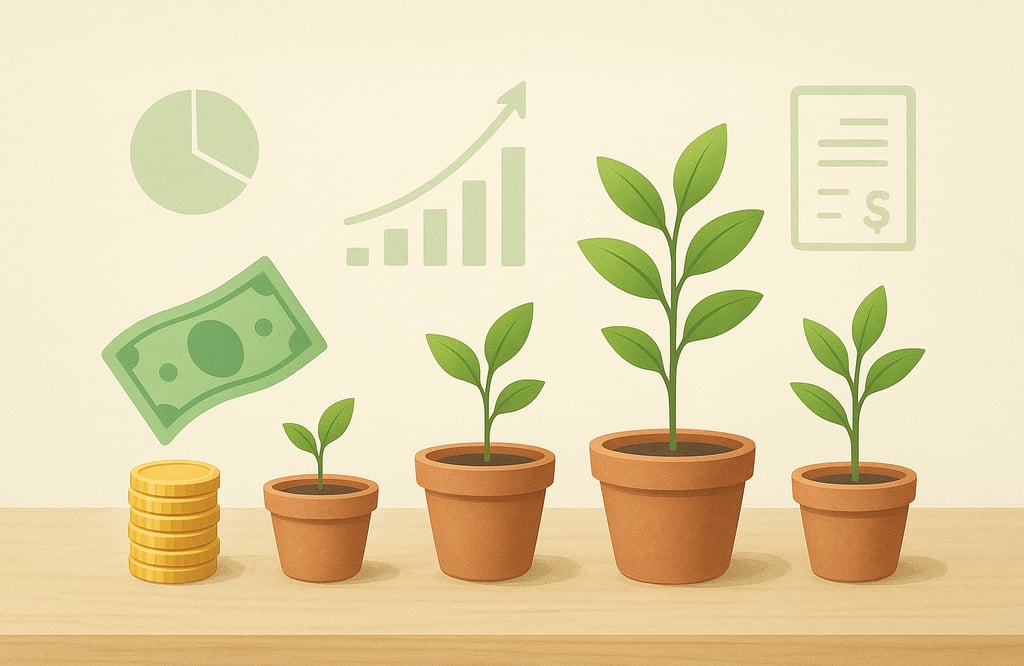The True Art of Saving
Unlock the true art of saving: practical tips, mindful habits, and simple routines that make managing money easier, calmer, and more rewarding.
11/14/20254 min read


Saving is not just a practical task or an exercise in discipline; it is a holistic process that involves awareness, organization, and a deep understanding of your personal habits and priorities. The true art of saving begins when you realize that your daily choices directly influence your relationship with money. Often, the challenge isn’t a lack of discipline, but a lack of clarity about how and why we spend. Without this awareness, even the most detailed budgets may fail, because they don’t address the root of the problem: the automatic habits and decisions that shape our financial life.
Small Daily Changes Make a Big Difference
With small, intentional adjustments in your daily routines, saving can become more natural and less exhausting. Reducing repetitive decisions, for example, helps prevent impulsive purchases and creates more predictability in your budget. Simplifying your environment — whether by reorganizing apps, limiting notifications about deals, creating structured routines, or keeping essential items easily accessible — encourages more conscious decisions.
For example, setting up automatic transfers to a savings account right after payday reduces the risk of overspending. Similarly, unsubscribing from promotional emails or turning off push notifications from shopping apps can prevent impulsive purchases. These small environmental adjustments may seem minor, but over time they lead to meaningful financial discipline without requiring extreme restrictions.
Understanding Emotional Spending
Many unexpected expenses arise from emotional triggers or automatic behaviors. It’s common to spend more when stressed, bored, or seeking comfort. Recognizing these patterns is key to regaining control over your finances. Saving doesn’t mean giving up everything you enjoy; it’s about prioritizing what truly matters in your life and context.
For instance, if dining out is important to you, plan a monthly budget for it instead of cutting it entirely. This allows you to enjoy life while staying financially disciplined. Over time, you’ll learn to differentiate between what has lasting value and what is simply a fleeting impulse, making your spending more mindful and strategic.
Tailoring Systems to Your Unique Life
Another crucial aspect of saving effectively is acknowledging that everyone has different circumstances, needs, and rhythms. What works for one person may not work for another. That’s why creating simple systems, such as automatically allocating money for essentials and financial goals, periodically reviewing expenses, or setting clear limits for different spending categories, can make money management easier and less stressful.
Consistency is more important than perfection. Small, habitual actions — like tracking weekly expenses or setting aside a fixed percentage for emergency savings — often have a bigger impact than sporadic, intense efforts or overly complex financial strategies.
Avoiding Comparison and Focusing on Your Path
Saving becomes stronger when we stop comparing ourselves to external standards or other people’s lives. We live in a society constantly driven by consumption and appearances, but each individual has unique goals and circumstances. By focusing on your own path, you make the process lighter and more sustainable, avoiding impulsive financial decisions influenced by social comparison or external pressure.
Aligning spending with your personal priorities ensures that money serves your life rather than controlling it. For example, if your priority is traveling, it’s okay to allocate a larger portion of your budget to experiences rather than material goods. Conversely, if long-term investment is your focus, reducing discretionary spending becomes a strategic choice.
The Power of Regular Reviews
Regularly reviewing your finances is a healthy and necessary practice. Small, periodic adjustments — such as evaluating spending patterns, reorganizing priorities, or redirecting resources toward important goals — help maintain balance and strengthen sustainable habits over time. You don’t need to track every detail daily; consistency and moderate discipline are key.
A practical tip is to schedule a monthly “financial check-in.” Use this time to analyze what worked, what didn’t, and which areas require adjustment. By reviewing progress regularly, you stay in control without becoming overwhelmed.
Investing in the Future While Enjoying Today
The art of saving isn’t just about cutting costs or delaying gratification indefinitely. It’s about balancing short-term enjoyment with long-term security. Setting realistic goals — like building an emergency fund, planning a vacation, or investing in retirement — provides motivation and clarity for financial decisions.
Incorporating small, rewarding habits, like celebrating milestones when you reach savings goals, reinforces positive behavior. This combination of foresight and enjoyment ensures that saving becomes a sustainable, empowering part of life rather than a source of stress.
Conclusion
The true art of saving lies in finding a balance between the present and the future, between desires and priorities. It is a continuous process, based on conscious choices, reflection on habits, and alignment with your lifestyle. When approached naturally and with planning, saving ceases to be a burdensome task and becomes an integral part of everyday life, contributing to a more organized, calm, and strategic financial routine.
Through clarity, intention, and gradual adjustments, you can develop a healthy relationship with money, build financial security, and turn small daily actions into meaningful long-term achievements. Saving is therefore more than just putting money aside: it’s about learning to spend mindfully, creating routines that support smart choices, and cultivating financial freedom through consistent habits.
When practiced well, this skill directly impacts well-being, quality of life, and the ability to achieve your dreams without sacrificing balance or peace of mind. By treating money as a tool rather than a source of stress, you can transform your financial habits into a lifestyle that supports both your present happiness and future stability.